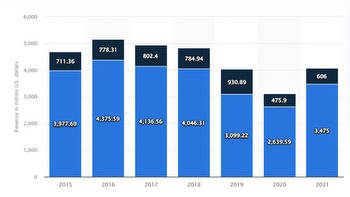The Opportunities and Challenges for Startups in the Online Gambling Industry

The online gambling industry is experiencing a boom period as legal sports betting expands across America. In 2022, gross gambling revenue in the U.S. gambling industry reached $60.4 billion—a 14% increase from the previous year.
The global online gambling market, valued at $63.53 billion, also continues to grow. Between 2020 and 2030, the U.S. online gambling market may experience a compound annual growth rate (CAGR) of 12.0%.
Sports betting and online casinos make up most of the market share.
With so much growth comes fierce competition. Gambling companies vying for new markets create welcome bonuses to cater to their target audience.
New startups in the online gambling industry may face enormous challenges, as well as once-in-a-lifetime opportunities.
Let’s look at the potential for start-ups to enter the market.
Online Gambling Industry Market Trends
Learning about the online gambling industry takes time to understand the role of major companies. Massive partnerships and buyouts have occurred in the past few years, leaving few dominant players.
The latest mergers and acquisitions include Caesars Entertainment’s $3.7 billion purchase of William Hill, a U.K. gambling company founded in 1934.
As a conglomerate with the non-defunct Harrah’s Entertainment, Caesars had successfully merged with El Dorado Resorts in 2020 after filing for bankruptcy in 2017.
In 2022, Caesars Entertainment sold off William Hill’s non-U.S. assets to 888 Holdings, a gambling company based in Gibraltar, for $2.88 billion.
Annual revenue for Caesars Entertainment in 2021 stood at $9.57 billion, an almost 164% increase from the previous year. It climbed 13% to $10.82 billion in 2022.
In a similar move, Penn Entertainment (formerly Penn National Gaming) bought Barstool Sports for $450 million in 2020.
These deals showcase a blossoming industry where major companies merge with smaller ones. Gambling companies face stiff competition—but there’s plenty of money to go around.
Smaller Online Gambling Companies
The online gambling industry contains some of the biggest companies worldwide. However, there are smaller participants based outside the U.S. in gambling-friendly jurisdictions.
For example, BetUS, a sportsbook and casino in San Jose, Costa Rica. The company took in an estimated $150 million in revenue in 2022.
Another offshore sportsbook and casino,BetOnline, maintains its headquarters in Antigua and Barbuda, a tiny Caribbean island. The company reportedly takes in between $2.5 – $5 million in revenue.
Las Atlantis Casino
Curaçao, another Caribbean island, is the headquarters of the Las Atlantis Casino. Las Atlantis offers one of the best welcome bonuses in the industry—worth 280% of first-time deposits up to $14,000.
Smaller gambling companies offer a personalized experience for players, allowing crypto deposits and withdrawals, too.
Consumers should do their own research before making deposits at offshore casinos. Reading a Las Atlantis casino review may be beneficial for newcomers to learn about its safety and reputation.
Top Gambling Companies in the World
Among the top gambling companies in the world, most also remain offshore. While a company like 888 maintains a headquarters in Gibraltar, Kindred Group is located in the island country of Malta.
With a market capitalization of $2 billion, Kindred Group contains nine gambling subsidiaries, including Unibet, which gets traded publicly on the Nasdaq.
Headquartered in Boston, Massachusetts, DraftKings is another well-known gambling company with a market cap of $5 billion. Entain, a major competitor headquartered in the Isle of Man, possesses a market cap of $9 billion.
Entain subsidiaries include London-based Ladbrokes Coral and BetMGM, one of the largest sports betting companies in the U.S.
A major challenge for gambling startups might be competing against international conglomerates that generate millions, if not billions, of annual revenue.
Legal Considerations
Two of gambling startups’ most basic legal considerations include taxes and regulation. The U.K. government taxes gambling companies at 15%, leaving consumers to enjoy their winnings tax-free. That’s not the case in the U.S., as states get to decide.
In an offshore tax haven like Gibraltar, businesses get taxed at a low rate of 0.15%. Licensing fees are only a fraction of the cost compared to the U.K. and America.
Sportsbooks in the U.S. might get taxed at 36% of revenue on top of hundreds of thousands of dollars worth of licensing fees and renewals.
Curaçao only charges a 2% tax on gambling businesses. So it’s no wonder many companies choose the U.K. or other offshore locations.
The Challenges of Competing with Established Players
Despite legal challenges, the gambling industry keeps growing. There were an estimated 4,305 global casinos and online gambling establishments in 2023, an increase of 7% from the previous year.
Major regions include North America, Europe, and South America.
Gambling companies must consider expenses including wages, rent, and utilities. As a gambling startup, you must conduct market research for your business plan, hire staff, obtain proper licensing, and advertise your brand.
It’s difficult, but competing with major gambling companies remains possible with ingenuity and persistence.
Do you have what it takes to get started?



























![Top 3 Largest Gambling Companies in the U.S. [New Case Study]](/img/di/top-3-largest-gambling-companies-in-the-us-new-case-study-1.jpg)







